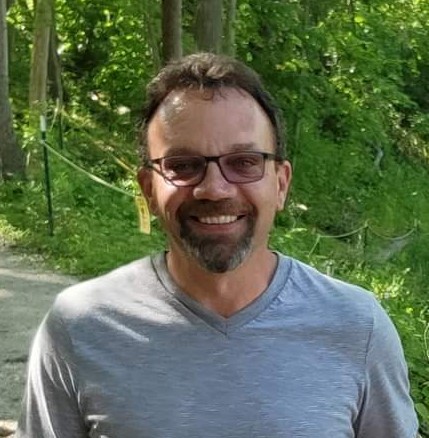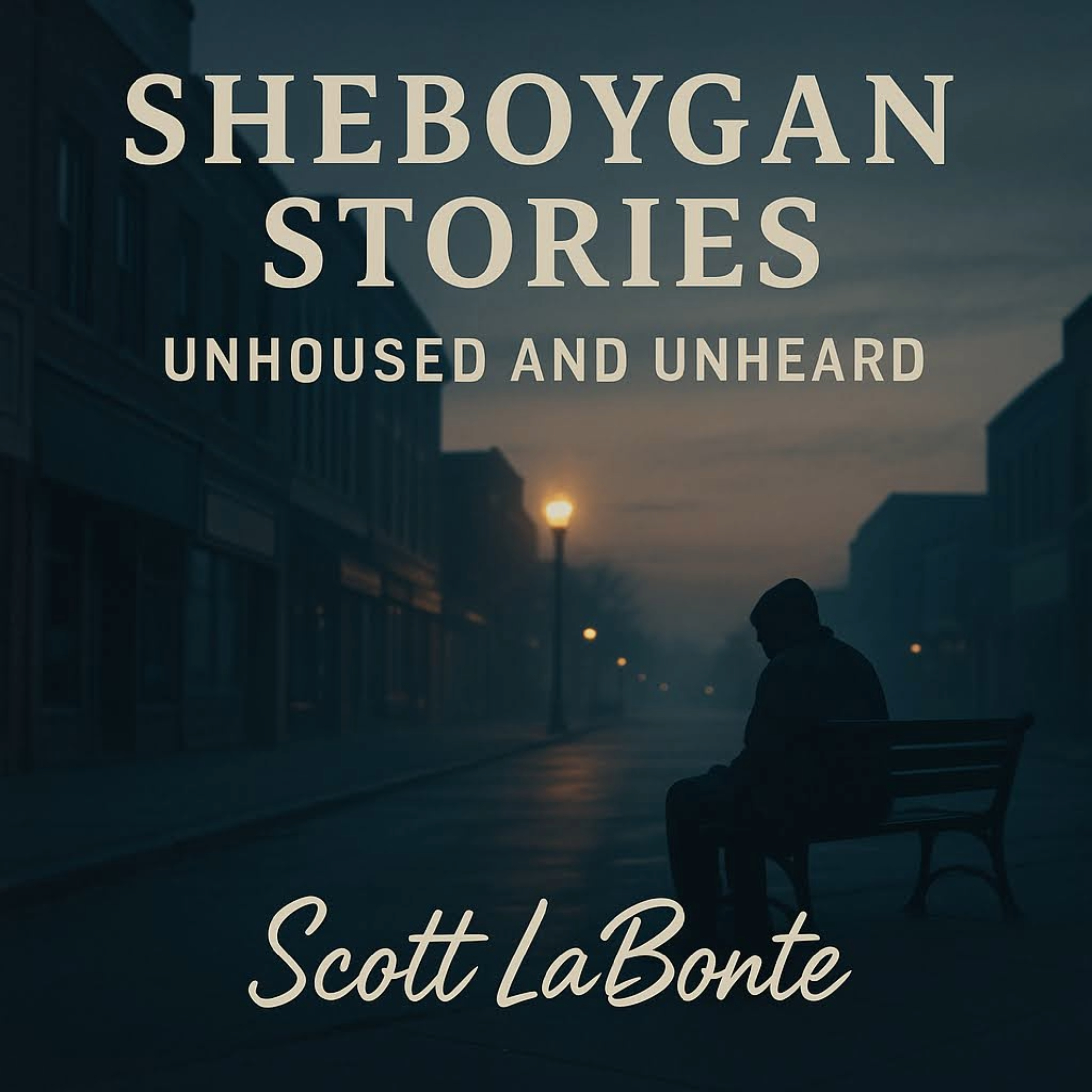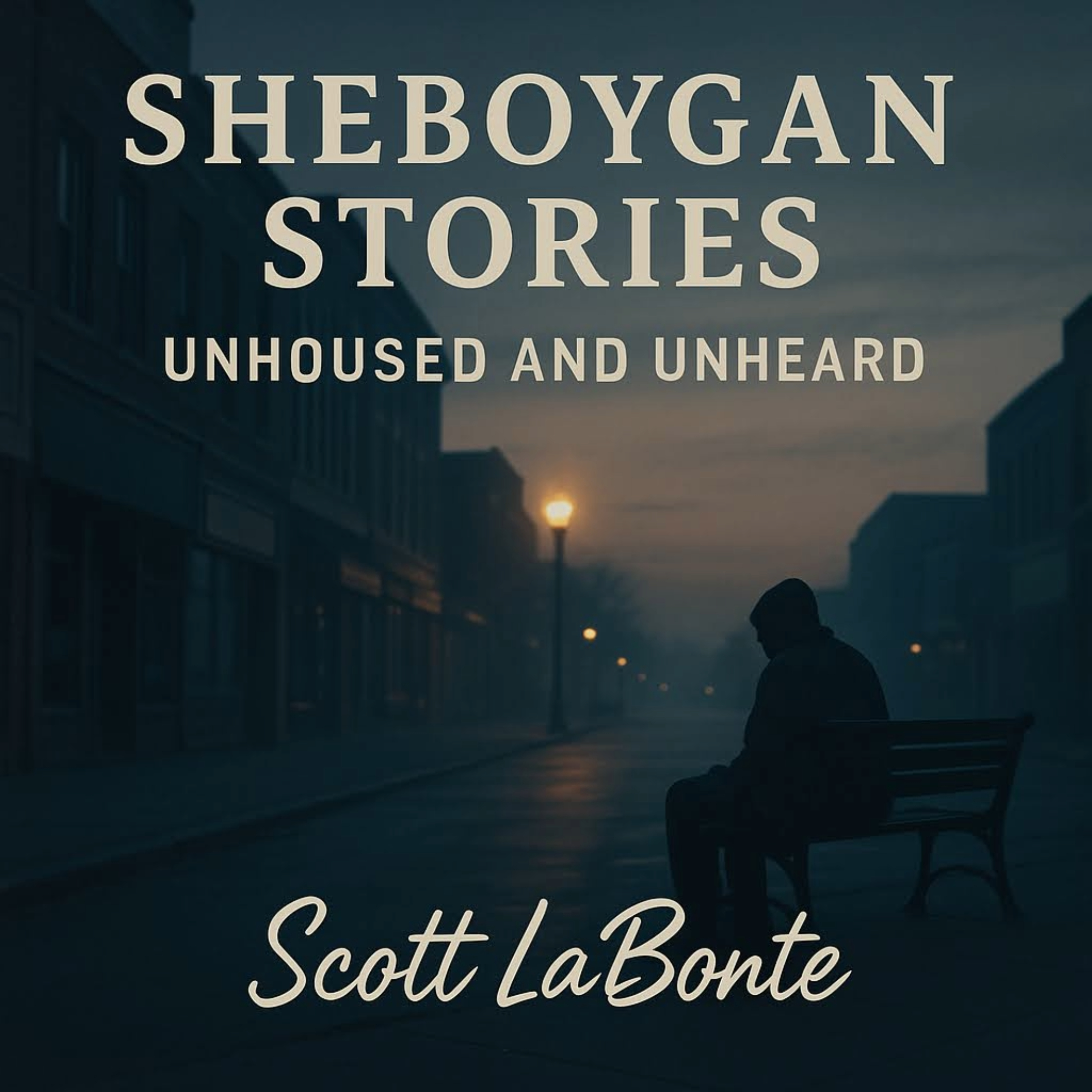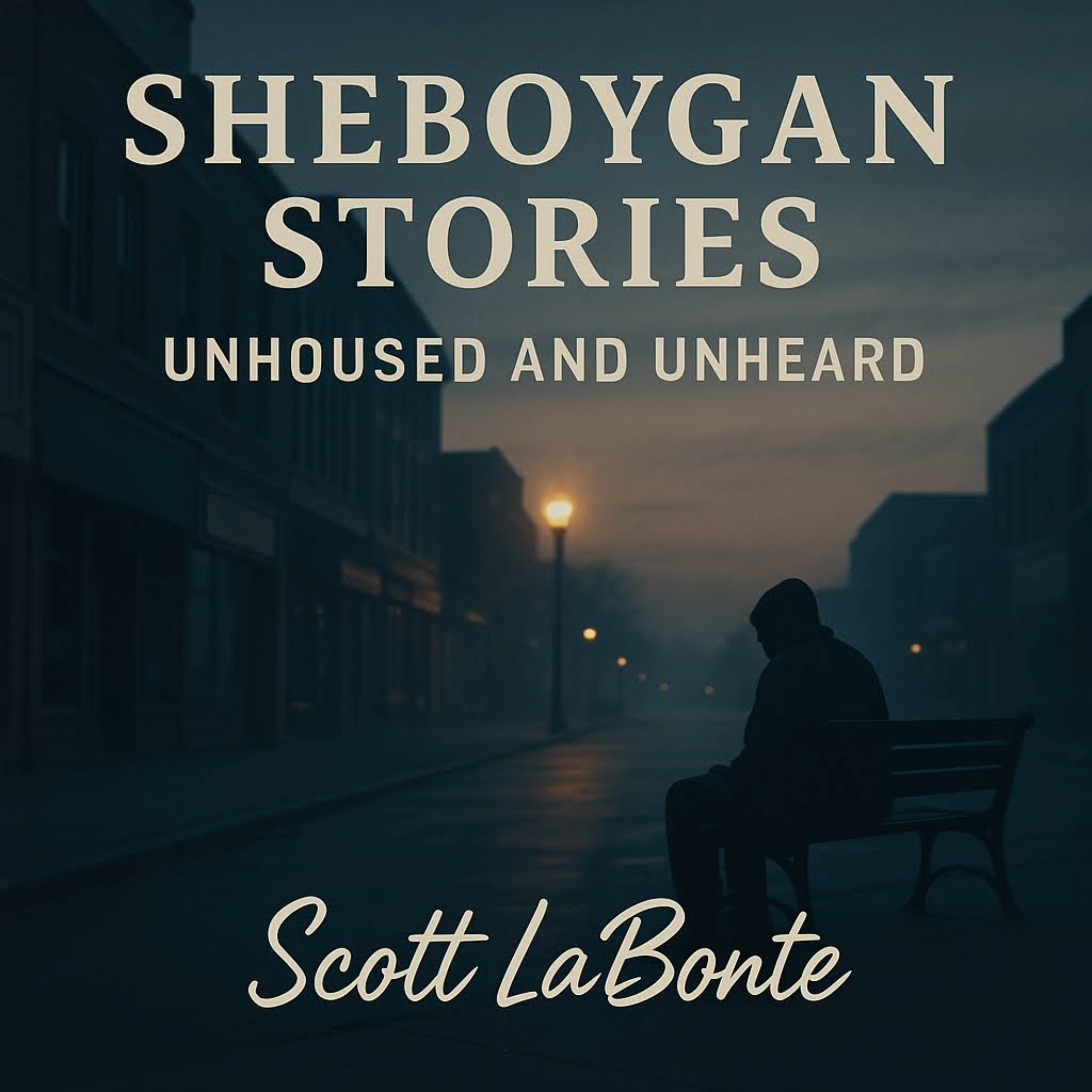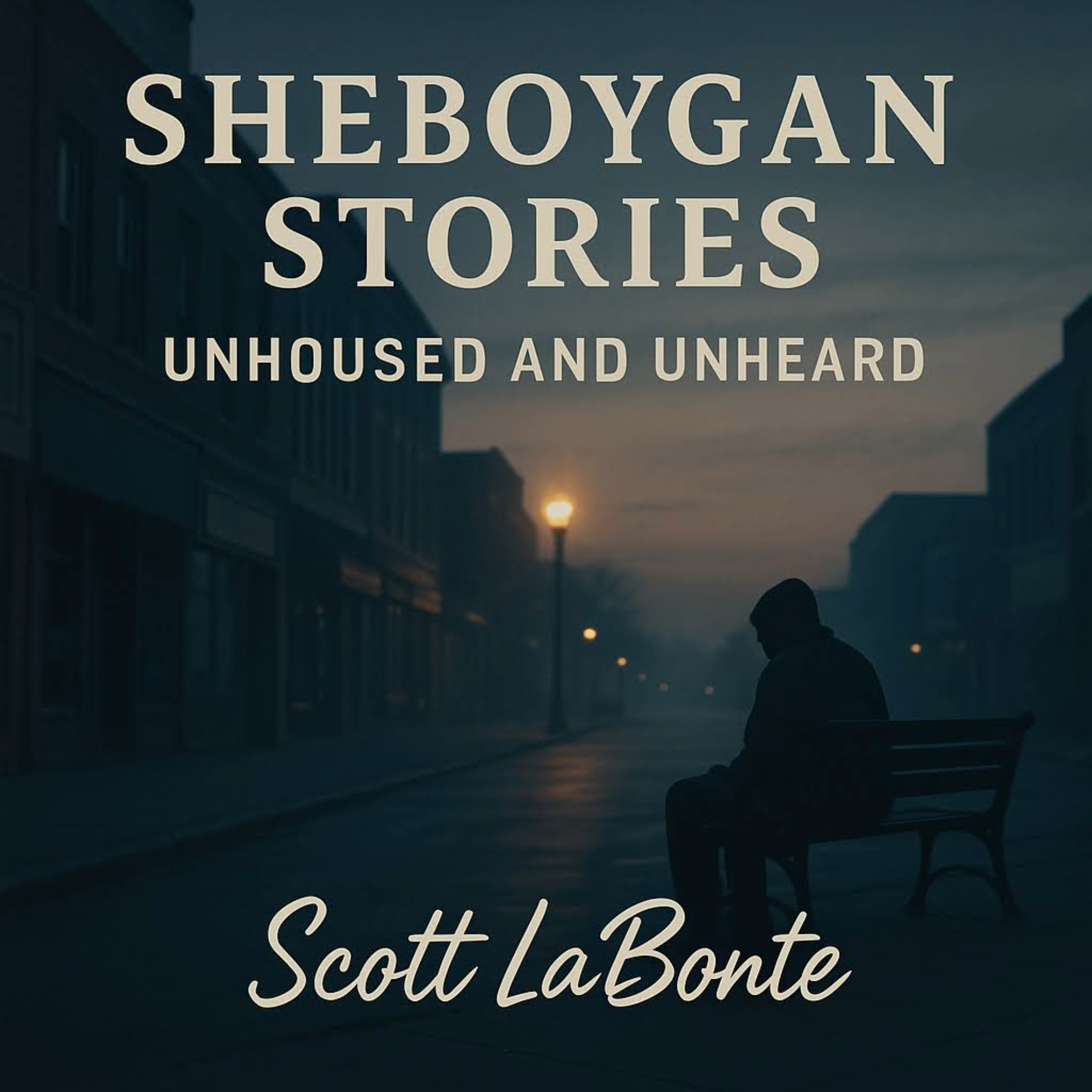Episode Transcript
[00:00:23] Speaker A: Welcome to Sheboygan Stories Unhoused and Unheard. I'm Scott labonte, and I'm not just your host. I'm one of the people who helped start something we now call Sheboygan Area Pay It Forward. And this is how it all began.
This podcast gives a voice to people who we so often walk past but rarely hear from those experiencing homelessness here in Sheboygan, Wisconsin. But before we dive in to other people's stories, we thought we'd start by sharing our own.
So I'm sitting here today with my wife, my partner in life, in this work, and in everything we built with Sheboygan Area Pay It Forward. We've really never told a whole story like this before. You ready?
[00:01:00] Speaker B: Yep.
[00:01:01] Speaker A: All right, let's start at the beginning. What was life like before all of this?
[00:01:07] Speaker B: Oh, my goodness.
Gosh, where do I start?
[00:01:15] Speaker A: Can I go back to even Madeline living in the upper.
[00:01:22] Speaker B: Well, we're originally from the UP of Houghton or up.
Start over. The UP of Michigan. We're up from the Houghton Hancock area.
Scott had three kids and I had three kids when we got together.
And now we raise our special needs granddaughter.
So we got custody of Madeline when she was 11 months old in 2012.
And we went from being, I guess, your everyday, typical, run of the mill people. Yeah. Family. To raising a very medically complex and fragile child. Everything changed, and we ended up with Madeline because my daughter had just turned 18 when Madeline was born and she was in active addiction and struggling.
I'm not going to give away too much of her story that's hers to share, but there was significant trauma involved in her teenage years and.
And it led to an opiate addiction.
So, you know, we did actually, I'll be honest, I did one of the hardest things ever and said, I'm going to court to take custody of Madeline, and either you're with me or you're not, you know, And I was right.
[00:03:01] Speaker A: By your side from day one.
[00:03:02] Speaker B: I'm good at ultimatums like that.
I'm doing this. Either you come along for the ride, or I'm just going.
So life started with Madeline, and we went from doing okay financially and me working and bringing in really good money at the restaurant that I worked at to barely being able to work because of Madeline's care and all of her medical needs.
I spent an average of a week out of every month or more at Children's Hospital in Milwaukee. That was seven and a half hours away from home with younger children still at home.
And it caused a lot of Financial hardship. I mean, at one point, we were ready to lose our house. It was going to go into foreclosure, and neither one of us is good about asking for help, so we never said a word to anybody. We did the. We'll figure it out. We always do.
[00:04:09] Speaker A: And we did.
[00:04:10] Speaker B: Yeah. And then some very unexpected angels showed up at our door with some money to make sure we saved our house. And they didn't know. I don't know if they ever knew that. But now they know if they're listening.
[00:04:27] Speaker A: Right.
[00:04:27] Speaker B: They. They saved our house. And that.
That started our journey with Maddy Tabs and the Pinuga Project that we did in the up, helping families.
[00:04:41] Speaker A: Kind of a precursor to what we're doing now, Right?
[00:04:43] Speaker B: Yeah. Well, you know, homelessness isn't really a thing where we're from because you would die in a snowbank because it's so much snow all the time. Hence why we don't live there anymore.
So, you know, we helped families any way we could with furniture, with clothing, with toys, with food. You know, I guess it's always been kind of ingrained in us because, you.
[00:05:10] Speaker A: Know, that's what you do. You help who you can, when you can, and how you can.
[00:05:14] Speaker B: Yeah. You know, after eight emergency medical flights in two years is when I said we need to move to Wisconsin because we need to be closer to Children's. I couldn't do it anymore. Madeline was. How old was she? Four.
[00:05:33] Speaker A: Yeah.
[00:05:34] Speaker B: At the time.
And that started our journey. It took us another year and a half, but we ended up in Sheboygan.
Everybody thought we were crazy. Sold everything we fell in love with.
[00:05:47] Speaker A: The lakefront, had to be by the.
[00:05:48] Speaker B: Lake when we would come down to Children's for appointments for about four months before we moved. Not quite four months before we moved.
We would adventure around to all the places that had water because, you know, we were always by Lake Superior, so had to be by water. And fell in love with the Lakeshore in Sheboygan and didn't know anybody, didn't have jobs, didn't nothing, and sold everything we owned, sold the house, packed the.
[00:06:15] Speaker A: U Haul, and here we are.
[00:06:18] Speaker B: And it'll be nine years, the end of July.
[00:06:20] Speaker A: Right.
[00:06:21] Speaker B: I couldn't wait. I have seen. I couldn't wait to live where nobody knew who I was.
[00:06:28] Speaker A: How'd that work for you?
[00:06:29] Speaker B: We're from such a small area. No matter where you went, somebody knew who you were. Oh, I know your dad. I know you know, hubby played in a rock band for 20 years. There was no going Anywhere without somebody knowing who you were. So I couldn't wait to live in a place where nobody knew who I was.
And now I go to Walmart or the gas station or the grocery store, and I hear, that's the pay it forward lady. When people are whispering when they walk by, or they come up and say, I know you don't know who I am, but I love what you do.
[00:07:07] Speaker A: I follow you on Facebook.
I keep tabs on everything you do.
[00:07:12] Speaker B: That little part of our life didn't work out so great, but that's all right. I'm good with that.
[00:07:16] Speaker A: We definitely went through some rough patches, and I think people who see us now might not realize exactly where we came from or who we are.
And that's why I wanted to start out with us here and kind of give everybody the idea of our background and how this came to be.
There was a moment all of this shifted. You know, we came here, we didn't know anybody.
Do you remember when the idea of pay it forward started? How did this come about?
[00:07:40] Speaker B: Oh, my God. December 13th of 2020.
I was.
I think I was in the bedroom doing some homework. I was doing my life and health coaching certification. Then I think, or, I don't know, I was working on something. But I came out, and hubby looks at me and says, oh, I just did something I think I might need your help with. And I was like, oh, gosh.
[00:08:06] Speaker A: Typical wife response was, what did you do?
[00:08:08] Speaker B: Yeah, what did you do now? And he says, I started a Facebook page. And I'm like, and what about it?
And he says, you know, it's called pay it forward.
Cause all the COVID crap was going on. And he said, I want to put those in need in touch with those who have, and vice versa, in strictly a pay it forward way. Just people being kind, sharing kindness.
And I was like, okay, okay, we'll see what this does.
[00:08:46] Speaker A: And now, mind you, at this point, we hadn't been here that long. Couple years. We were still at the point nobody knew who we were.
I didn't figure it was ever going to do anything. I figured, you know, it's not, you know, we're just average Joes. They're probably wondering, you know, who are we?
[00:09:05] Speaker B: Yeah. Well, by December 23rd, we had somehow rallied through that little Facebook page and provided Christmas for nine families with 28 children. And seven of those families included the entire meals, right down to the stick of butter to go in the mashed potatoes.
[00:09:25] Speaker A: Yeah.
[00:09:25] Speaker B: And I did all that shopping and I did all that running and I was working, and at that point, there was already over 400 people in the group. And I remember looking at them on the 23rd after we had delivered everything, and I just looked at him and said, you may need my help. Excuse me.
[00:09:46] Speaker A: Well, you know, things kind of blew up a little bit, but in a good way.
[00:09:50] Speaker B: We were very quickly.
It was very quickly brought to our attention, like, immediately, the unhoused population in Sheboygan and the help.
Yeah. Or lack thereof. You know, and we like to learn lessons the hard way. So I own that to everybody. Obvious. I'm owning it here. I. I learned lessons the hard way.
[00:10:15] Speaker A: I didn't realize there was any other way.
[00:10:17] Speaker B: Right. Well, you know, and I have to learn them, like, six times before. I'm like, okay, that's true.
[00:10:22] Speaker A: Right?
[00:10:23] Speaker B: That's true. I'm not gonna get it. That's one way.
[00:10:25] Speaker A: It will sink in.
[00:10:26] Speaker B: Yeah. I'm not gonna get a different outcome. So that's true. You know, we. We overextended ourselves. We put a lot. Yeah, I still do that.
We put people in hotels. We provided items.
We took people into our home. That was a one and done. We learned that lesson very quickly.
[00:10:49] Speaker A: That was almost a. Yeah, that was definitely a lesson learned.
[00:10:53] Speaker B: Yes.
So then we slowly started critiquing what we do and figuring. Figuring out what we want it to look like. And then that. I think it was February.
Abby Reese. I love you, Abby Reese. She invited me to a housing coalition meeting, and Santino Laster came on the housing coalition meeting and said he had gotten the Roca Room opened up for our peers experiencing homelessness so they could come in any in the middle of the freezing weather, and they didn't have to go outside. And it's like. But they don't have food. And so me. First one in this meeting, I'm like, we'll help. I'll ask on our.
[00:11:38] Speaker A: Put a post out on a page.
[00:11:40] Speaker B: I'll put a post out on our page.
And next thing you know.
[00:11:45] Speaker A: And so it begins.
[00:11:47] Speaker B: Right. Next thing you know, it went from 10 bag lunches a week to the assembly line of 250, plus sandwiches a week and granola bars and all the items and then the hygiene items.
[00:12:02] Speaker A: I gotta say, though, we had that down to a science. We had an assembly line on our kitchen counter. We had it mastered.
[00:12:07] Speaker B: And I. And I will say we had somebody who initially started out helping us with that, and, you know, lessons learned.
[00:12:22] Speaker A: Went rogue.
[00:12:23] Speaker B: Yeah. Lessons learned.
[00:12:24] Speaker A: For lack of a better term, we're.
[00:12:25] Speaker B: Super grateful for what they did. At that time, though.
[00:12:27] Speaker A: Yes.
[00:12:28] Speaker B: Very grateful for what they did. Still. I'm very grateful.
[00:12:32] Speaker A: It helps shape who we are and what we've become at this point.
[00:12:34] Speaker B: Yes, yes, very much so. So, you know, I'm grateful for what they did for us in our organization.
[00:12:44] Speaker A: And our peers and the connections they helped build.
[00:12:47] Speaker B: Yes. Yeah, I'm grateful for that. I mean, you know, obviously, we parted ways, but that's.
Everything happens the way it's supposed to, whether we understand that or not.
[00:12:59] Speaker A: Right. And in its time.
[00:13:01] Speaker B: Yes. So enough on that. I just wanted to make sure to get that gratitude out there.
[00:13:06] Speaker A: Awesome.
[00:13:08] Speaker B: We ended up moving from the library because things grew and grew and it wasn't the appropriate place anymore. It was not for us to be doing that.
[00:13:19] Speaker A: Covid restrictions were lifting. More and more people were coming back to the library, and risk of sounding terrible, they didn't want to see our peers hanging around the library.
[00:13:30] Speaker B: Oh, exactly. And, you know, when you had a table with all that stuff and. Yeah, it's a lot. It takes up a lot of room. Yeah. So then the open door opened their door for us and shared space with us for a year and a half. We'd go there for an hour a day, Monday through Friday, and hand out snacks and lunches and. And all of that. That's where the need was proven for the community cafe. And we helped.
Helped in that process of getting the community cafe started, which I'm super grateful for, because it's the there for our peers and for other community members that we didn't serve.
[00:14:11] Speaker A: Huge assets to the community.
[00:14:12] Speaker B: Yeah, it's a huge asset to the community. So, you know, I'm super grateful to Liz for taking the initiative to get that started and for making it what it is now and, you know, for Donna managing it since it started. Happy retirement, by the way, if you're listening, Donna.
You know, and it's nice to see that that will continue in our community because it's a much needed resource.
[00:14:36] Speaker A: Yes.
So we never thought it'd become a day center, but the need was screaming, essentially.
[00:14:43] Speaker B: Yeah.
[00:14:43] Speaker A: People were cold. They were outside. They had nowhere to go, and nobody was stepping up. So we did.
What does this place, the day center, mean to you?
[00:14:55] Speaker B: Oh, my goodness.
This day center. Anybody who comes in and sees us knows this day center is my heart and soul.
[00:15:05] Speaker A: Absolutely.
[00:15:08] Speaker B: I'm gonna cry already.
[00:15:10] Speaker A: That's all right.
[00:15:15] Speaker B: With not being open right now, because for anybody who's not listening, the space that we've been in for the last year and a half, the city condemned the building. So we had 30 days notice to clean your shit out and move on.
[00:15:33] Speaker A: Right.
[00:15:34] Speaker B: So now I'm back to doing the outreach that I was doing prior to our center opening, that we were trying to avoid doing the outreach that the very first thing I said when we got the notice was I'm not doing that again. I'm not doing that. It's exhausting. I can't do that. Well, guess what, I'm doing it anyway.
[00:15:52] Speaker A: And it's taking over our garage, it's taking over our basement just like. Well, kind of full circle.
[00:15:59] Speaker B: No, it's not taking over our basement like it was. No, not at all. But.
[00:16:03] Speaker A: But brings us right back to our roots, right back where we started.
[00:16:06] Speaker B: Yeah, we, we were just out on Friday. I was running errands Friday and I was meeting with peers and had a meeting and getting all the things done and I received a message from a local company. Thank you, Sheboygan Paper Box. They had had a retirement party or luncheon or something. Anyway, they had leftovers and they reached out to me and so I booked over there and picked them up and then went and got some takeout containers and greeted hubby after work and said, alright, we have to heat this all up. And we packaged up a ton of complete taco meals with tacos and refried beans and rice and got the bottled water out of the garage because it has a home there right now and packaged it up, loaded it in the truck, loaded the child in the truck and we just went tooling all over downtown till we found everybody and handed them all out.
[00:17:04] Speaker A: 21 full taco meals.
[00:17:06] Speaker B: There is nothing more fun than showing up in an alley where there's very well to do community members outside taking a break from whatever dinner they have going on at one of the fancy places and me booking down the alley going, here's your doordash dinner, enjoy your tacos. You get some looks. But you know, it's all good and.
[00:17:30] Speaker A: Right and it was good. And nobody else needed to know why we were there.
[00:17:33] Speaker B: No, it's none of anybody's business what we're doing. But you know what, our friends are out there and we're gonna make sure that they're taken care of.
[00:17:41] Speaker A: Whether we have a space or not. We're gonna make sure that they get what they need.
[00:17:45] Speaker B: Right. You know, I think that probably sends us down a whole other rabbit hole and I don't know if that's where you.
[00:17:53] Speaker A: Well, we, we do have some time constraints. I don't want to drag this out and Bore everybody.
[00:17:58] Speaker B: Oh, it's not boring.
[00:17:59] Speaker A: It isn't. I know, but where would you like to go with this?
[00:18:03] Speaker B: I just wanted to say, you know, there's such a stigma when people see the unhoused. Or for us, it's our peers, because they're our equals. They are people just like us. You know, every single person is one crisis away from experiencing homelessness. Your crisis may need to be bigger than my crisis.
[00:18:30] Speaker A: I'm just a teacher. That wouldn't be my.
[00:18:31] Speaker B: But, right, you're just a teacher. I don't get a paycheck for what we do. So, you know, we're just. We have one big crisis with Madeline and oh, shit, I hope the community steps up because we're in trouble.
[00:18:45] Speaker A: We'll be at the library with everybody else if you're looking for us.
[00:18:47] Speaker B: Right.
We'll be out there and, you know, and at one point, that would have terrified me. And now I can just laugh because I know a whole community of loving souls who would take care of us.
[00:18:59] Speaker A: Right. Well, we always say it's not perfect, it's messy, it's real, but it's honest work and it's rooted in love.
[00:19:06] Speaker B: Absolutely.
[00:19:08] Speaker A: So kind of tying off of where you were just going with that. You know, people have no idea.
What would you say to someone who has no idea what it's like to walk in the shoes of our peers?
[00:19:23] Speaker B: Be kind.
[00:19:25] Speaker A: Right?
[00:19:26] Speaker B: Be kind. If you see somebody coming at you. And I have witnessed this myself multiple times. When we started out on Michigan Ave. I will say the landlord was awesome. Penny was amazing for giving us a chance when nobody else would give us a chance. The space was very small. We knew on day three that we needed a bigger boat. So, like, the hunt for a bigger center started on day three.
But I saw. I saw two sides of things. I saw a super generous community come out to support us and love us and to provide all of the things, like all of the food and all of the items and the volunteers. And I mean, we saw that side of it, that supportive side of it, but at the same time, I saw some of the nastiest people I have ever seen in my life on Michigan Ave. While standing outside with our peers simply smoking a cigarette. Because unless you know what my face looks like, you're not going to be able to pick me out.
[00:20:37] Speaker A: Most of the time they were dressed better than I am.
[00:20:39] Speaker B: You're not going to be able to pick me out. I mean, ask my kids. My kids are all adults, but ask my kids. I'm like they used to joke that.
[00:20:46] Speaker A: I'm the bank lady, people of Walmart type things. That's. Yeah, she fits.
[00:20:51] Speaker B: I'm. I'm like. I'm like, you know. Yeah, I'm the old stereotypical bag lady. When you see me in my sweats and my slippers and my oversized sweatshirt and. Yeah, and something fuzzy. I ripped up jeans and T shirts and. But, yeah, I. I experienced some of the nastiest human behavior I have ever seen in my life on that street. Simply because they had backpacks. Yeah, they had backpacks. Or they knew that we were located right there, and they were outside next to there. You know, our police department was bombarded with phone calls, and you know what the biggest complaint was? They're on the sidewalk.
Well, no shit, people.
[00:21:37] Speaker A: News flash. They're allowed.
[00:21:38] Speaker B: They're allowed on the sidewalk, just like you're allowed on the sidewalk, because they are truly no different than you or I. You know, there's a stigma that comes with homelessness for addiction. And, you know, I'm so tired of hearing, oh, they're all addicts, and they'll hurt you and they'll. Mm. Come on, folks.
[00:22:01] Speaker A: Those episodes are coming, too.
[00:22:02] Speaker B: Yeah. I'm in that center by myself all the time with our peers.
[00:22:06] Speaker A: Right.
[00:22:06] Speaker B: All the time.
[00:22:07] Speaker A: You know, and I've had people multiple times ask me, you know, why do you do this kind of stuff? Why? You know, how did you get into this? Why would you do that? And I don't hesitate to tell them. Some of the most amazing people I've ever met in my life have been within those four walls. And I mean that if. Give them a chance. Some people are very guarded. Some people, you know that. And understandably so. They get treated like garbage on the street, you know, as we were just talking about.
But once. Once they let you into your world or their world, and you really start to know who they are. They're some truly amazing people.
[00:22:44] Speaker B: They absolutely are.
[00:22:45] Speaker A: Resilience, their determination. They're just. Their will to keep going.
[00:22:50] Speaker B: Right.
[00:22:51] Speaker A: Is impressive. There's a lot of people out there that could learn a lot from our peers.
[00:22:56] Speaker B: Absolutely. So, yeah, back to the original question. I tend to, like, I can talk forever shiny things, so. Right Squirrel moments.
Be kind. When you see somebody downtown and they have a backpack on, because we don't have a brick and mortar center right now for them to stash their stuff, how about if you smile and say hi instead of ducking your head and booking to the other side of the.
[00:23:22] Speaker A: Street or pretending you don't actually see them.
[00:23:24] Speaker B: Right, right. Sit down, have a conversation.
Because those are some of the most amazing conversations I've ever had in my life.
[00:23:36] Speaker A: Oh, 100%.
[00:23:37] Speaker B: Yeah. Absolutely.
[00:23:39] Speaker A: Right.
We see people. That's what we do here. And this podcast is a way to continue to see people. And we're going to try to get their voices out.
As I said in the description, we're not trying to speak for anybody. We're just going to give them the microphone. And those episodes are coming.
Is there anything else you'd like to add?
I do, I do. Thinking about it popped in my head.
Even though we don't have the brick and mortar building right now, we are still doing the outreach lunches every Sunday. We have a, we do have a sign up on our website, sheboygan areapayetteforward.org we look forward to, you know, the community stepping up, providing those lunches for us.
Typically, we feed 50, 60 ish people.
[00:24:29] Speaker B: Yeah, 50 to 60.
[00:24:31] Speaker A: You are welcome to hang out and serve if you'd like. You are not obligated to by any means, but our peers enjoy that. When you kind of hang out, get to know them, get to talk with them, you realize they're not so bad, Right?
[00:24:45] Speaker B: It's a lot of fun. And if you're athletic, you can get involved in a mean game of basketball while you're there.
[00:24:50] Speaker A: Right?
Right. I don't because they'll show me up.
Alrighty. So thanks for listening to this first episode of Sheboygan Stories on how is it unheard? If this story moved you, share it, talk about it and keep coming back. There's so much more to hear. If you want to support the work, visit us@sheboygan areapayetforward.org or sheboygan area. Pay it Forward on Facebook. Next episode, we're going to sit down with one of our peers who lives this on the streets and has the experience probably for years because there's quite a few of them and it's a story that you won't forget until. Until then, keep your heart open. Pay it Forward.
